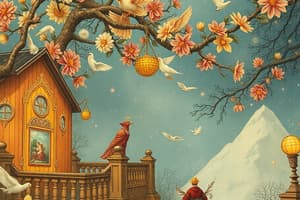Podcast
Questions and Answers
In literature, not everything expressed in words is considered as literature.
In literature, not everything expressed in words is considered as literature.
True (A)
The child found a little book on the seashore.
The child found a little book on the seashore.
False (B)
The child in the text heard strange sounds from the shell because it came from another world.
The child in the text heard strange sounds from the shell because it came from another world.
False (B)
The child's face filled with wonder as he listened to the murmurs of the shell.
The child's face filled with wonder as he listened to the murmurs of the shell.
The man explaining the sounds from the shell was actually a woman in disguise.
The man explaining the sounds from the shell was actually a woman in disguise.
Hyperbole is the deliberate understatement of actions and ideas for the sake of emphasis.
Hyperbole is the deliberate understatement of actions and ideas for the sake of emphasis.
The child's wonder was due to the unnoticed harmony of the old world.
The child's wonder was due to the unnoticed harmony of the old world.
Personification gives human qualities to things, ideas, or animals.
Personification gives human qualities to things, ideas, or animals.
Simile directly gives inanimate objects human-like characteristics.
Simile directly gives inanimate objects human-like characteristics.
Alliteration refers to the repetition of vowel sounds in words coming together.
Alliteration refers to the repetition of vowel sounds in words coming together.
Irony is when words are used in a way that their literal meaning is the same as their intended meaning.
Irony is when words are used in a way that their literal meaning is the same as their intended meaning.
Imagery is the use of literal language to describe actions, objects, and ideas.
Imagery is the use of literal language to describe actions, objects, and ideas.
Personification is a type of literary element.
Personification is a type of literary element.
Hyperbole is a kind of literary technique used by writers to develop their works.
Hyperbole is a kind of literary technique used by writers to develop their works.
Metaphor and simile are examples of literary elements.
Metaphor and simile are examples of literary elements.
Moral is a literary element that is extensively employed by writers to develop their pieces.
Moral is a literary element that is extensively employed by writers to develop their pieces.
A simile is a figure of speech that directly compares two different things using the words 'like' or 'as'.
A simile is a figure of speech that directly compares two different things using the words 'like' or 'as'.
Hyperbole is a subtle and understated form of language used in literature.
Hyperbole is a subtle and understated form of language used in literature.
Flashcards are hidden until you start studying
Study Notes
Literary Devices
- Simile: a comparison between two unlike things using "like" or "as"
- Example: "My love is like a red, red rose"
- Metaphor: a comparison between two unlike things without using "like" or "as"
- Example: "He is an old fox, very cunning"
- Hyperbole: deliberate exaggeration of actions and ideas for emphasis
- Examples: "Your bag weighs a ton!", "I have got a million issues to look after"
- Personification: giving a thing, an idea, or an animal human qualities
- Examples: "The flowers are dancing beside the lake", "She is a real beauty!"
- Imagery: use of figurative language to create visual representations of actions, objects, and ideas
- Examples: "The room was dark and gloomy" (visual), "The river was roaring in the mountains" (auditory)
- Alliteration: same consonant sounds in words coming together
- Examples: "Better butter always makes the batter better", "She sells seashells at seashore"
- Irony: use of words with opposite intended meaning
- Example: "The bread is soft as a stone", "So nice of you to break my new PSP!"
Literature
- Definition: a form of human expression, derived from Latin "littera", meaning "a letter of the alphabet"
- Description: a body of written works, but not everything expressed in words is counted as literature
- Importance: has two aspects - enjoyment and appreciation, and analysis and description
Literary Elements
- Definition: inherent structures in a literary piece, used to develop a literary work
- Examples: plot, setting, conflict, characters, theme, moral
Literary Techniques
- Definition: structures used by writers to convey their message, including artistic and reader-appeal ends
- Examples: metaphor, simile, alliteration, hyperbole, allegory
Story Elements
- Plot: logical sequence of events that develops a story
- Setting: time and place in which a story takes place
- Characters: roles or personas in a literary piece
- Protagonist: main character of a story or novel
- Antagonist: character in conflict with the protagonist
- Conflict: issue in a narrative around which the whole story revolves
- Theme: central idea or concept of a story
Studying That Suits You
Use AI to generate personalized quizzes and flashcards to suit your learning preferences.




